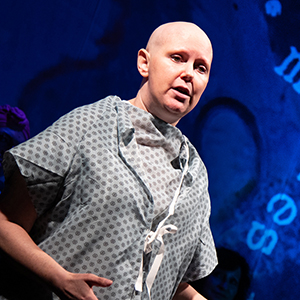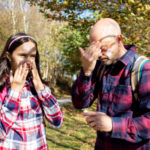-
Cancer, On and Off Stage
Erin Cronican, who has stage IV breast cancer, plays the lead role of a professor diagnosed with metastatic ovarian cancer in the New York City production of Wit.
by Pamela Rafalow Grossman
-
Acknowledging the Stress of Cancer
A patient advocate session at the San Antonio Breast Cancer Symposium offered practical tips for dealing with cancer.
by Marci A. Landsmann
-
2021: The Year in Cancer News
The Cancer Today editorial staff selects some of the most impactful reporting and essays of 2021.
by Cancer Today Staff
-
Telling Your Children About Your Advanced Cancer Diagnosis
Providing age-appropriate information can help children process your diagnosis and ask questions.
by Lorna Collier
-
Improving Your Diet One Plate at a Time
The New American Plate suggests gradual changes to build healthier eating habits.
by Jon Kelvey
-
Cooking Demos for Cancer Survivors
Culinary medicine translates the science of nutrition into the art of cooking.
by Jen Tota McGivney
-
Forward Look
Understanding Sunscreen RecallsSmall amounts of benzene have been found in products from major sunscreen brands.
by Bradley Jones
-
Risk in the Air
Air pollution can increase a person's risk of developing cancer, a burden that isn't shared equally in every neighborhood.
by Jon Kelvey
-
Practical Considerations for Cannabis
People with cancer who are thinking about using cannabis to manage cancer-related symptoms should seek answers to some practical questions.
by Kate Yandell
-
An Emerging Treatment for Metastatic Prostate Cancer
A drug that delivers radioactive particles to prostate cancer cells increases overall survival for metastatic castration-resistant prostate cancer.
by Pamela Rafalow Grossman
Cancer Talk
Treatment Combination Improves Survival in EGFR-positive Lung Cancer
Adding chemotherapy to targeted therapy improves outcomes for people with advanced EGFR-positive non-small cell lung cancer.
by Sandra Gordon
Lessons From 20 Years Living With CancerMultiple myeloma survivor Jonathan Gluck reflects on uncertainty, and the scientific progress that has kept him living with cancer for more than two decades.
by Eric Fitzsimmons
The Enduring Importance of Cancer Disparities ResearchOpening session from AACR conference highlights how perseverance and adversity have informed cancer disparities research over the years.
by Eric Fitzsimmons
Most Cancer Survivors Don’t Meet Healthy Diet GoalsDespite research linking fruits and vegetables to cancer survival, many people do not change their eating habits after diagnosis.
by Darlene Dobkowski














